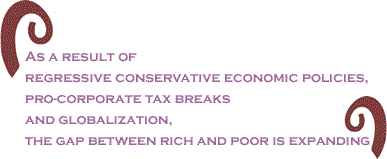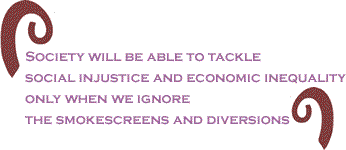
|
|||||||||||||||||||||
|
The current issue is always free to all readers If
you need the access available to a |
|
 |
|
What's all this fuss about illegal immigrants? It seems that the xenophobes are back for a command performance. The minutemen, those self-deputized, modern-day fugitive-slave catchers, stand ready at the border to arrest, shoot and kill Mexicans, ostensibly for the good of the nation. Individuals such as cable-TV commentator Lou Dobbs further degrade America's journalistic standards through their anti-immigrant, anti-Latino invectives. States and localities enact harsh anti-immigrant laws, then react with befuddlement when the migrant workers don't return, and the crops are ruined because no one is available to harvest them. Meanwhile, politicians, hungry for votes and eager to bring out the worst in the American people, sound the clarion call to erect a giant fence on the U.S.-Mexico border that supposedly will make all of America's problems vanish. Scapegoating is a time-tested American tradition, and the concept of the scapegoat has followed humankind throughout history. It has served as the means by which a society may transfer its sins and cleanse itself. Ancient and contemporary societies alike have utilized the scapegoat as the personification of their hatred, a receptacle into which groups and social systems pour their fears and frustrations. Ancient societies engaged in the practice as part of custom and ritual. During the day of atonement, a goat was chosen by lot. The priest placed his hands on the head of the goat, and confessed the sins of the community. The goat—or scapegoat—was cast off, released into the wilderness, and the people were cleansed of their sins. Through the ritual transfer of the sins of the community to the goat, or any material object of choice, the community was left feeling purged and guiltless.
In the modern context, scapegoating involves a far more rational — and far less ritualistic — process. In many instances scapegoats serve to preserve the status quo. However, in the end, sacrificing the scapegoat does not solve a society's problems. The social psychologist, Eliot Aronson, developed the scapegoat theory of prejudice, also called the displaced aggression theory. According to Aronson's theory, people who find themselves in adverse situations may be inclined to lash out at the source of their problems. However, it is often difficult for people to retaliate against the direct cause of their frustrations. Therefore, these individuals or groups will project their frustrations onto others, particularly those who are hated, visible and powerless. An important example of this phenomenon is the persecution and attempted total annihilation of Jews during the Nazi regime in Germany in the 1930s and 1940s. Clearly, scapegoats are the victims of a highly psychological process. However, psychology alone does not adequately explain the forces at play. Indeed, scapegoating involves political and economic factors as well. Under the economic and political competition model, when resources are relatively scarce, the dominant group in society will try to exploit a minority for material gain. Discrimination and prejudice are heightened during times of tension and increased competition over limited resources. For example, Carl Hovland and Robert Sears determined that in a given year between 1882 and 1930, there was a direct relationship between the price of cotton and the number of lynchings of Blacks. As the price of cotton decreased, the number of lynchings increased. Implicit, is the assumption that during depressed economic conditions, a society experiences heightened frustrations. Further, in the aftermath of the Tokyo Earthquake of 1923, which claimed the lives of 100,000 people, several thousand Koreans were brutally massacred. Apparently, there were rumors that Koreans were attacking and killing Japanese, plundering, and setting fires. More important was the existence of racial hatred stemming from the influx of Korean labor.
The group in power is able to maintain its dominance, to a degree, through the process of "divide and conquer," that is, forming false alliances with other oppressed and marginalized groups. Through this process, Southern aristocracy was able to convince poor whites to fight and die for the Confederacy, in an effort to perpetuate a system of slavery that rendered the labor of poor whites superfluous and kept them in poverty. And in Civil War-era New York City, the Irish — who competed with African Americans for the bottom rung of the socio-economic ladder — lynched Blacks out of anger over the military draft enacted by Congress. In the modern-day American context, Blacks, Latinos, Asian-Americans, Muslims and people of Arab descent (or perceived Muslims and Arabs), gays and lesbians and other groups rotate for the title of scapegoat du jour. As people in power keep the populace focused on one or more of these groups at any given time, crimes are committed in high places and go unnoticed. That's by design. Now, the issue of so-called illegal immigration is in the spotlight. It is far easier to blame your unemployment or low wages on the person who picks the fruit, buses the tables, delivers the pizza or mows the lawn, than to focus on the systemic problems in society. Rather than make unsubstantiated claims about undocumented workers who jump the border and steal jobs away from native-born citizens, let us focus on what actually matters: the United States is experiencing the largest transfer of wealth in its history. As a result of regressive conservative economic policies, pro-corporate tax breaks and globalization, the gap between rich and poor is expanding. And the American Dream is an illusion. As the Pew Charitable Trusts recently reported, there is far less economic mobility in the United States than was previously thought. In fact, America is less economically mobile than many other nations, including Canada, France, the Scandinavian countries, and Germany. Median household income has declined over the past thirty years, and the present generation is worse off than the generation that preceded it. Between 1972 and 2001, the income of people in the top 1 percent grew by 87 percent. For people at the very top - the 99.99th percentile - the income gain was 181 percent. By contrast, the bottom 20 percent grew by only 3 percent.
The top 1 percent of households owns almost twice as much of the nation's corporate wealth as they did 15 years ago. Between 1978 and 2005, CEO pay increased from 35 times an average worker's pay to 262 times, making more in an hour than a worker makes in a month. Meanwhile, in 2004, 23 million people used food stamps, according to the U.S. Department of Agriculture, up from 17 million in 2000. Further, nearly 47 million Americans, or 16 percent of the population, were without health insurance in 2005. Building a wall on the Mexico border, making English the official language and denying legal and social services to undocumented aliens will not cure these ills. The wall idea was tried and failed in Berlin, Belfast and other places, just as it is doomed to failure in Israel and Gaza. During this time of discontent in the land, it is convenient to scapegoat Latinos, now the largest "minority" group, in a nation in which 100 million people, one-third of the population and growing, are of color. Society will be able to tackle social injustice and economic inequality only when we ignore the smokescreens and diversions. Only when we resist the temptation to scapegoat will we begin to address the myriad crises plaguing the nation. When they have all of us fighting over the crumbs, the loaf is much more easily stolen. BC Columnist David A. Love is an attorney based in Philadelphia, and a contributor to the Progressive Media Project and McClatchy-Tribune News Service. He contributed to the book, States of Confinement: Policing, Detention and Prisons (St. Martin's Press, 2000). Love is a former spokesperson for the Amnesty International UK National Speakers Tour, and organized the first national police brutality conference as a staff member with the New York-based Center for Constitutional Rights. He served as a law clerk to two Black federal judges. Click here to contact Mr. Love. |
|
| Home | |
| June
7, 2007 Issue 232 |
||||||||||||||
|
||||||||||||||
| Printer Friendly Version in resizeable plain text format | ||||||||||||||
|
|
||||||||||||||
 |
||||||||||||||
 |
||||||||||||||
 |
||||||||||||||
| |
||||||||||||||
| |
||||||||||||||





































